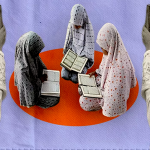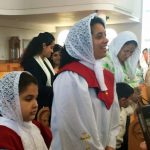By Mohamed Saad Khiralla –
After exploring in the first part of this interview with human rights activist and political analyst Magdi Khalil the historical and political background of the Coptic plight in Egypt, and shedding light on the roots of the issue and its far-reaching dimensions, we now turn in this second part to an even more pressing discussion.
Here, we examine the mechanisms of discrimination embedded within the state’s machinery, and the role played by the institutions of Egypt’s military-authoritarian regime in perpetuating this suffering.
But this is not merely a conversation about problems it is an unmasking of hidden and silenced truths, paired with practical proposals that could place the Coptic cause squarely on both national and international agendas.
Let’s dive straight into the questions.
1- Are there religious freedoms in Egypt, generally, and for Copts in particular?
There is an important distinction between Worship Rights and Religious Freedom Rights. In Egypt, worship is restricted to what are called the Abrahamic religions, and the state officially recognizes only two faiths besides Islam: Christianity and Judaism.
Christians and Jews have the right to worship, but under heavy restrictions. As for broader religious freedom, it does not exist in Egypt at all.
Since the release of the U.S. International Religious Freedom Reports in 1999, Egypt has been classified either as a Country of Particular Concern or placed on the Watch List.
According to Freedom House, Egypt has always been rated “Not Free” since the inception of the report and continues to be so.
In the annual report of Open Doors, Egypt ranges from being an extremely oppressive state toward Copts to one of the highest-ranking countries in Coptic persecution. The report repeatedly states that “it is nearly impossible to convert from Islam to another religion in Egypt.”
According to the Pew Research Center’s report on religion and public life, Egypt is one of the worst countries in the world in restrictions on religious freedom (2009 report). It ranks 13th globally in societal hostility toward religious freedoms, 5th among the worst countries for religious conversion and related violence, and the highest worldwide in calls to execute apostates from Islam (94%).
This is only a small part of numerous international reports that entirely refute the existence of genuine religious freedoms in Egypt.
2- Copts are persecuted: what are the manifestations of this persecution?
Indeed, Copts have suffered violent and chronic persecution since the Arab-Islamic conquest of Egypt in 642 CE, although the intensity of persecution has varied across different periods.
Since 1972 until now, Copts have endured severe waves of persecution. Some of the documented manifestations include:
- Over five thousand attacks on Copts, their churches, properties, and lives during this period, many of which involved massacres and deadly bombings targeting churches and Coptic gatherings.
- Systematic and planned government discrimination against Copts in all aspects of life in Egypt, compounded by widespread societal discrimination.
- Killings of Copts are on the basis of religious identity.
- Intentional burning of hundreds of Coptic churches.
- Thousands of cases of forced disappearances of Coptic girls and women, compelling them to convert to Islam.
- Impunity and the absence of justice in most crimes committed against Copts.
- Takfir, denigration, and negative stereotyping of Copts.
- Forced displacement of Copts from their villages and homes to appease extremist Muslims.
- Most cases of religious defamation in Egypt implicate Copts, with Egypt ranking second only to Pakistan in this phenomenon. Thousands of Islamic media outlets attack and demean Christianity daily, while if Copts respond, they are accused of insulting Islam.
- Cultural persecution, such as banning the teaching of the Coptic language and prohibiting instruction on the Coptic era in schools and universities.
- Restrictions on Copts in their professional and private activities.
Copts issues are classified as a security file by intelligence and national security agencies, as if 15 million Copts constituted a criminal group or posed a threat to national security.
There exists a deep-rooted, widespread culture of hatred against Copts.
Overall, all forms of persecution against Copts are considered state crimes driven by religious and racial hatred.
3- Why are there no Copts in high sovereign positions?
Copts are deliberately excluded from all sovereign institutions in Egypt.
No Copt holds any decision-making position in Egypt. Dr. Boutros Ghali wrote in his book Egypt’s Road to Jerusalem that President Sadat refused to appoint him Minister of Foreign Affairs to prevent his attendance at National Security Council sessions, even though his grandfather had been Prime Minister of Egypt and two of his uncles had served as Ministers of Foreign Affairs and Finance during the monarchy. In his memoir Seven Years in a Glass House, Boutros Ghali noted that Africa, not Egypt, nominated him as UN Secretary-General, and that France, not Egypt, campaigned for him and supported him until he attained the position.
No Copt holds a position in Egypt’s multiple sovereign security agencies.
Only 1–2% of Copts are present in crucial institutions such as the judiciary, prosecution, diplomacy, university faculties, and the senior administrative apparatus of the state.
There is not a single Coptic university president, despite Copts holding such positions in the West. Not a single Copt is a professor in obstetrics and gynecology departments, even though the founder of obstetrics in Egypt was the Copt Naguib Mahfouz Pasha.
Copts are also almost entirely excluded from participation in the national football team and the Olympics, prompting complaints to FIFA regarding this discrimination against Copts.
During the monarchy and British occupation, two Egyptian prime ministers were Copts, along with a Coptic Minister of War, a Coptic Parliament Speaker, and Coptic ministers of Foreign Affairs and Finance. Many senior leaders of the ruling secular Wafd Party were Copts.
Currently, in the West, a Coptic American serves as U.S. Deputy Secretary of Defense, another as head of the U.S. Food and Drug Administration, a Coptic Australian serves as Deputy Minister of Defense, the FAO Director-General is Coptic, and dozens of other senior positions are held by individuals of Coptic descent.
4. Are there repeated allegations of organized operations targeting Coptic girls and young women? There have been repeated allegations of organized operations targeting underage and young Coptic girls, compelling them to change their religion under threats, blackmail, or forced isolation, amid almost complete security and media silence. How accurate are these allegations, and who benefits from the continuation of this phenomenon?
Yes, there have been cases of forced disappearance of Coptic girls and women spanning decades. The Coptic Church has been complaining about this criminal phenomenon since 1976 and reiterated its concerns several times. Naturally, Coptic organizations abroad have documented this phenomenon and publicized it internationally.
These crimes involve criminal gangs, Al-Azhar institution, as well as the Egyptian State Security or National Security today. It is a planned and funded phenomenon aimed at targeting, breaking, and humiliating Coptic families. Thousands of cases have disappeared suddenly, with victims forced to convert to Islam under threats and blackmail. We have repeatedly demanded transparency and investigations to stop these crimes, yet Egypt’s deep Islamic state considers supporting these crimes a victory for Islam and a “womb jihad” to Islamize these wombs. Under international law, these acts constitute crimes of enforced disappearance, human trafficking, and crimes against humanity according to the Rome Statute.
Is there a greater atrocity than rape jihad? A Muslim rapes a Coptic victim and then threatens her to convert to Islam, otherwise she faces public disgrace and dissemination of videos. In conservative societies, these girls fear exposure and declare conversion to Islam to avoid shame… The greater problem is: how can a state that conceals, colludes with, and even aids these crimes be described?
5. Why do the vast majority of Egyptian human rights organizations, inside and outside the country, ignore or complicitly treat the Coptic issue? It is observed that the vast majority, if not all, of the Egyptian human rights organizations, both domestic and abroad, deal with the Coptic issue with either deliberate ignorance or total complicity. Some justify this under the broader concept of a “citizenship state.” What is your opinion of this approach, and do you consider it an acceptable justification?
Most of these human rights organizations are owned and managed by Muslims and follow the line of the Egyptian state regarding the Copts. Those working in them are not from Mars; they are Muslims influenced by a climate of racism and discrimination against Copts. Therefore, they ignore all forms of persecution and crimes against Copts, justify these crimes, or adopt the state’s narrative that these are “violent incidents from both sides,” even though there is a clear aggressor and a victim.
6. How do Egypt’s Copts view normalization with Israel?
Copts are patriotic and love Egypt deeply, considering it their homeland and the land of their ancestors for thousands of years. Egypt’s history is their history, and its name is part of their identity.
When Egypt’s lands were occupied, Copts fought alongside Muslims to reclaim them. There is a plaque in the Egyptian Medical Syndicate listing the names of doctors killed in the October 1973 war; over 60% of them were Copts.
However, after the 1979 peace treaty and the full restoration of Egyptian territories, most Copts consider Egypt’s hostility toward Israel to be an Islamic religious hostility, of which they are not part.
Copts do not hate Jews as Islam instructs Muslims to; on the contrary, there is a shared Christian-Jewish heritage that Copts cherish and believe in. Jesus Christ was born Jewish and lived his life in the land of Israel. Likewise, the Virgin Mary was born Jewish and lived her life in the land of Israel, and all the apostles of Christ were Jewish. Moreover, 80% of the Bible that Christians believe in is the Jewish scriptures.
For this reason, Copts support peace with Israel and most support normalization with it. They wish their visits to the holy sites in Jerusalem to be easy and not complicated as they are currently. A Copt wishing to visit the holy sites in Jerusalem must obtain a permit from Egyptian intelligence, and many are interrogated upon their return.
Copts reject the Islamic narrative about Jews and Palestine. They consider their cause Egyptian and believe that since Egypt has regained its land, it should focus solely on its own affairs, not Palestine, and end the state of hostility entirely toward Jews and Israel.





